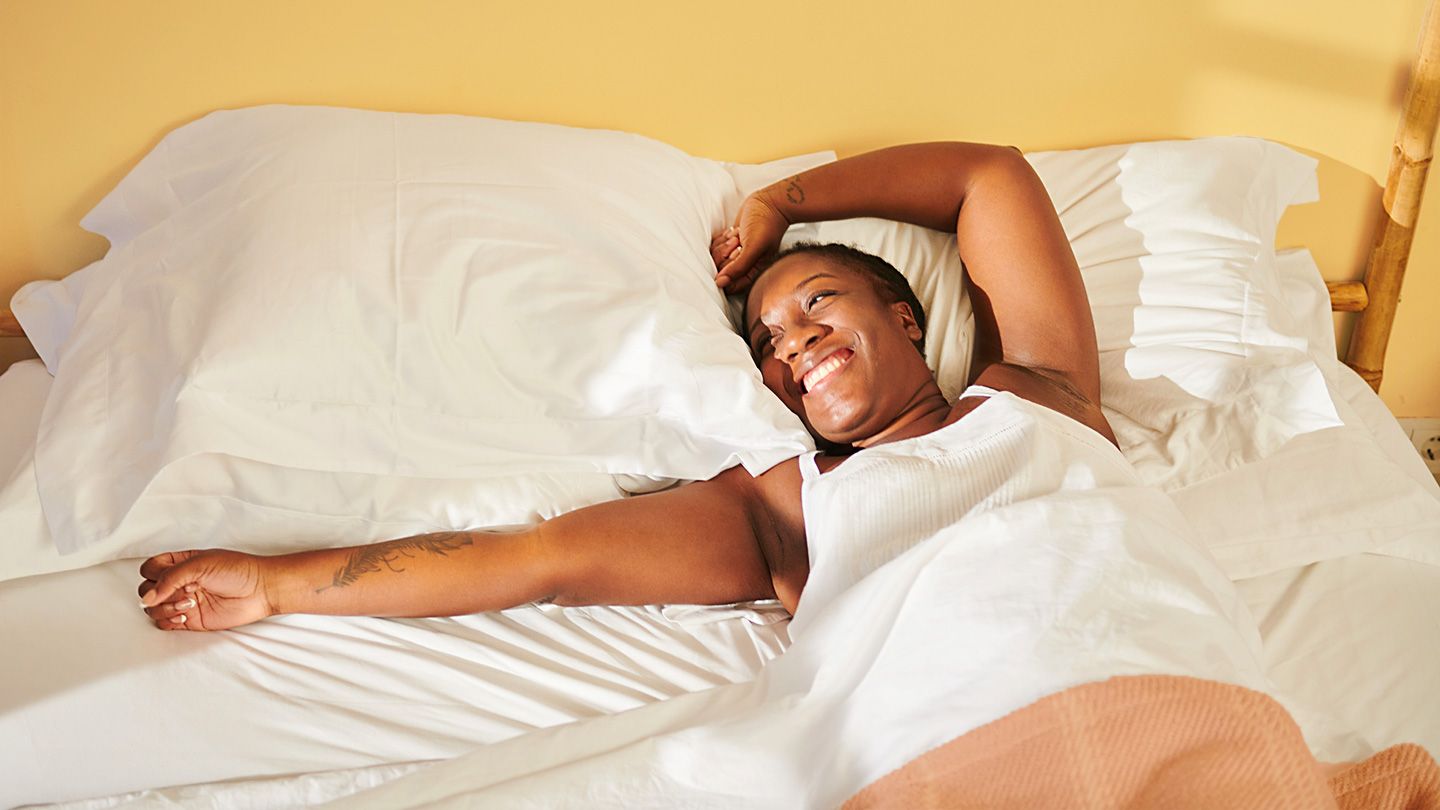Wondering how to wake up earlier? There are plenty of benefits of being an early bird but you’ll only come to know them if you’re getting up earlier.
Tweaking your sleep schedule to become a morning person can lead to improved daytime performance, healthier eating habits, and a decrease in depression and stress.
As the saying goes, “The early bird catches the worm.”
Take Apple CEO Tim Cook for example. He starts his mornings at 4:00 AM, and most would agree, he’s certainly caught the ‘worm’ (or apple in this case).
If your goal is to get plenty of sleep and wake up before the sun rises, rest assured, there are simple methods and practical solutions you can effortlessly work into your bedtime routine.
Continue reading so you can learn how to wake up earlier without sacrificing time in bed.
Want to Know How to Wake Up Earlier? Here’s How.
Have you ever found yourself hitting the snooze button on your alarm clock until you absolutely must get out of bed?
Quit fighting with your alarm clock — it’s a frustrating and unproductive way to start the day.
Waking up refreshed and eager to jump out of bed might be easier than you think.
With some minor adjustments, you’ll be singing with the birds in no time.
#1 – Plan a motivating morning time routine

One way to wake up earlier is by having something to look forward to in the mornings when it’s time to get out of bed.
Think about how you look forward to getting off work at the end of the day. Why is that? Chances are it’s because you schedule enjoyable activities for after your shift.
But, what if you slipped a few of those fun activities into your mornings instead?
Studies show that an active morning routine can help to get rid of feelings of sluggishness in the morning.
Plan a morning routine filled with productive activities that get the heart rate up and encourage the brain to start ticking over.
For example, consider listening to an engaging podcast that gets your brain working in the morning.
Alternatively, get in the routine of going for a walk with your friend. You’ll get to socialize and feel good knowing you’ve exercised while most of the world is still sleeping.
Simply having something pleasurable to look forward to can help you start your day in a great mood and serve as a motivator to wake up earlier.
#2 – Use a gradual wake-up light alarm
Have you ever felt like a zombie wandering through brain fog the moment your alarm clock rudely awakens you from a deep sleep?
There’s actually a medical term for it: ‘sleep inertia’.
According to sleep expert, Raphael Vallat:
“When we wake up from sleep, our brain does not immediately switch from a sleep state to a fully awakened state but rather goes through this transition period called sleep inertia that can last up to 30 minutes.”
This is why a loud, sound-powered alarm can cause such shell-shock in the morning.
One potential solution to avoid this disturbing wake up is to use a wake-up light alarm.
These ‘smart’ alarm clocks use light, rather than sound, to get you bright-eyed and bushy-tailed in the morning.
They will slowly ease your brain awake by gradually increasing the brightness of the light bulb over 30 minutes.
During this period, you’ll allow your brain to naturally progress through its wake cycle.
When you use a light alarm, you may wake up feeling like you just drank a cup of coffee, leaving you alert, efficient, motivated, and productive.
#3 – Improve your bedtime routine

A bedtime routine refers to all of the activities you perform in the hours before bed.
Improving your bedtime routine means engaging in activities that will help you relax and promote sleep.
For example reading, yoga, or sipping chamomile tea are all parts of a healthy routine that may help you fall asleep quicker.
The most important aspect of a healthy bedtime routine is sleeping at the same time every night.
Having a consistent schedule will help tune your circadian rhythm, your body’s natural way of regulating sleep and wakefulness.
When it comes to sleep, your body clock craves consistency.
If you constantly fall asleep at 10:00 PM every night, after seven to eight hours of sleep, your body will naturally begin to wake-up.
Sleep expert, Hope Bastine, advises that you try incremental changes:
“Pick a goal to wake up and go to bed and micro-adjust your schedule incrementally towards your goal time. Aim to give yourself two weeks and start with waking up 15 minutes earlier a day.”
The bottom line is, when you go to bed earlier you’ll wake up earlier. Improving your bedtime routine will help you in your efforts to fall asleep.
Consider reading some tips from sleep expert, Guy Meadows, on improving your routine at night.
#4 – Get a handle on your depression

Depression is a mental health disorder characterized by a person’s loss of interest in activities, leading to significant impairment in quality of life.
If you’re depressed, you’ll likely find it difficult to wake up early in the morning.
Sleep disorders are both a risk factor and symptom of depression.
According to researchers at the Harvard Medical School, depression doesn’t simply sprung from a chemical brain imbalance — there are many possible causes.
You may be experiencing depression due to faulty mood regulation by the brain, genetic vulnerability, stressful life events, medications, and/or other medical problems.
People suffering from acute depression may find relief through lifestyle changes like exercising regularly or engaging in a healthier diet.
But if you’re feeling depressed, the best course of action is to consult your doctor for a long-term treatment plan.
#5 – Have consistent wake-up times everyday

If you’re wondering how to wake up earlier, start by forcing yourself to get up at the same time every day.
Your circadian rhythm (natural body clock), is the 24-hour internal clock in your brain that regulates cycles of alertness and sleepiness.
Think of consistently waking up at the same time as a way to adjust your body clock to a favorable time.
If you follow a consistent wake-up schedule, you will start to naturally wake-up at that same time every day without an alarm clock.
Even if you don’t get the recommended seven to eight hours of sleep, you still have to force yourself up and out of bed.
In the beginning, you may find yourself a bit tired throughout the day but this feeling is natural and will help you fall asleep quicker the next night.
Although difficult at first, consistency is the key to getting your circadian rhythm on track.
#6 – Wake up to the smell of coffee

Coffee contains high levels of caffeine which helps you feel more alert and awake.
But did you know that simply smelling the wonderful aroma may have similar benefits?
A recent study found that coffee-like scents improved people’s performance on analytical reasoning tasks.
Two groups of college students were given the same exam. One group was in a room full of coffee-like scents and the other was not.
The participants in the coffee-scented room performed better on the exam.
Don’t get too excited though, researchers suggest that there is no scientific explanation for the increase in performance other than a likely placebo effect.
Even so, setting your coffee maker to brew a hot pot an hour before you aim to wake up may trigger feelings of wakefulness and alertness.
#7 – Sleep with the shades open

If you sleep with the shades closed, it’s likely because you don’t want the sun to wake you up in the morning.
So, it goes without saying that when you do leave the shades open, you’ll likely wake-up with the sun.
In fact, the sun is your body’s natural way of knowing when it’s time to fall asleep and wake up.
When the sun goes down and there is a lack of exposure to light, your body produces a sleep hormone known as melatonin.
The release of melatonin is the first step in your body’s natural sleep cycle.
When the shades are open and the glow of the sun shines through your window in the morning, melatonin production is suppressed. This tells your body that it’s time to wake up.
To Summarize
Hopefully, you now have a better idea of how to wake up earlier.
There are many tips and tricks when it comes to waking up earlier in the morning but no matter your approach, consistency is the key.
If you’re having a tough time you may be trying to take on too much.
Think of the famous sleep quote from W. H. Auden, “Truth, like love and sleep, resents approaches that are too intense.”
In the beginning, it may be a struggle but it will help if you shift your morning wake-up time just a little bit each day.
Stick with it and your battle with the snooze button will be a thing of the past.
Need more help with waking up in the morning? Check out more of our helpful guides on how to wake up earlier and more refreshed.

Welcome to Snoozerville! I’m Dr. Alex Hartley, your guide to the world of restful sleep. With a Ph.D. in Sleep Science and years of experience as a sleep therapist, I’ve dedicated my life to understanding and improving sleep quality. My passion lies in uncovering the mysteries of sleep and sharing practical, science-backed advice to help you achieve the best rest possible. Beyond my academic pursuits, I’m an advocate for mindfulness and relaxation techniques, which I incorporate into my daily routine. At Snoozerville, I aim to transform your nights, combining the latest research with easy-to-implement tips. Whether you’re a chronic insomniac or just looking to improve your sleep hygiene, join me on this journey towards peaceful, rejuvenating sleep.

